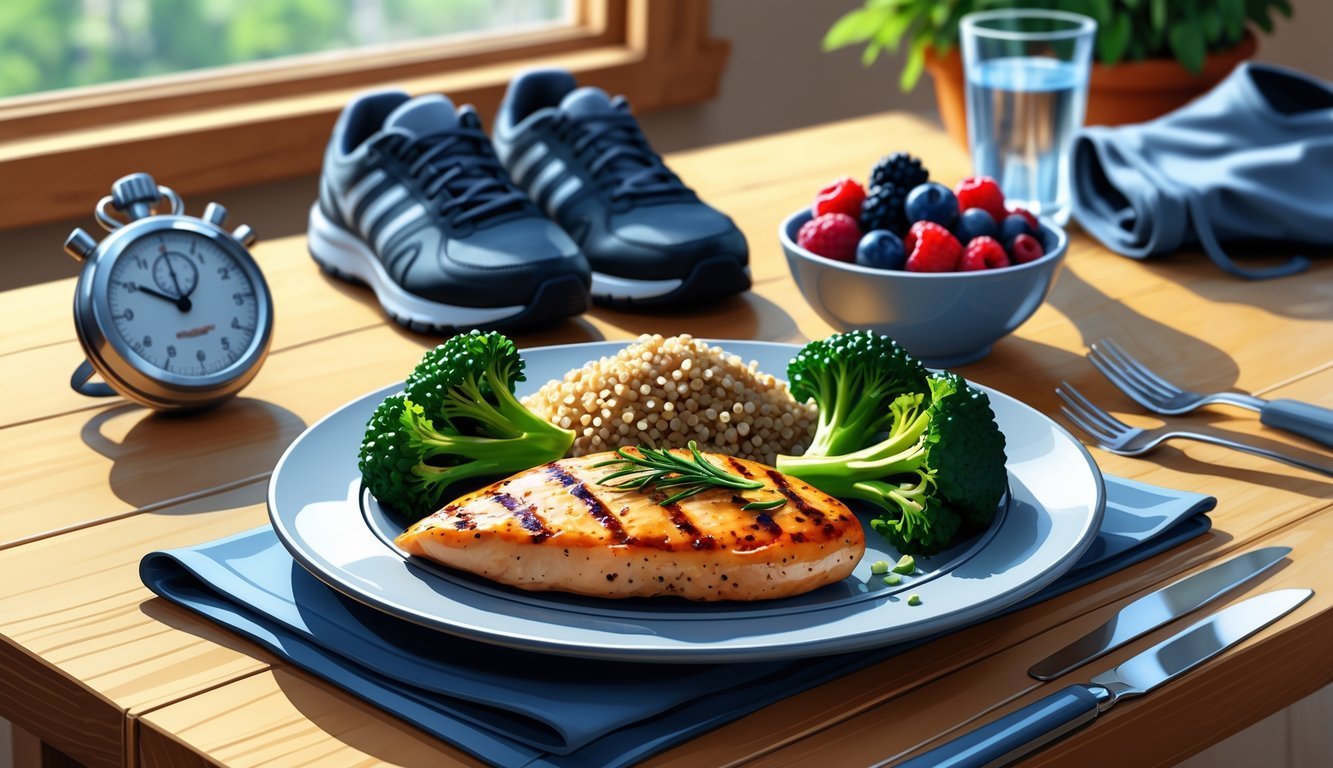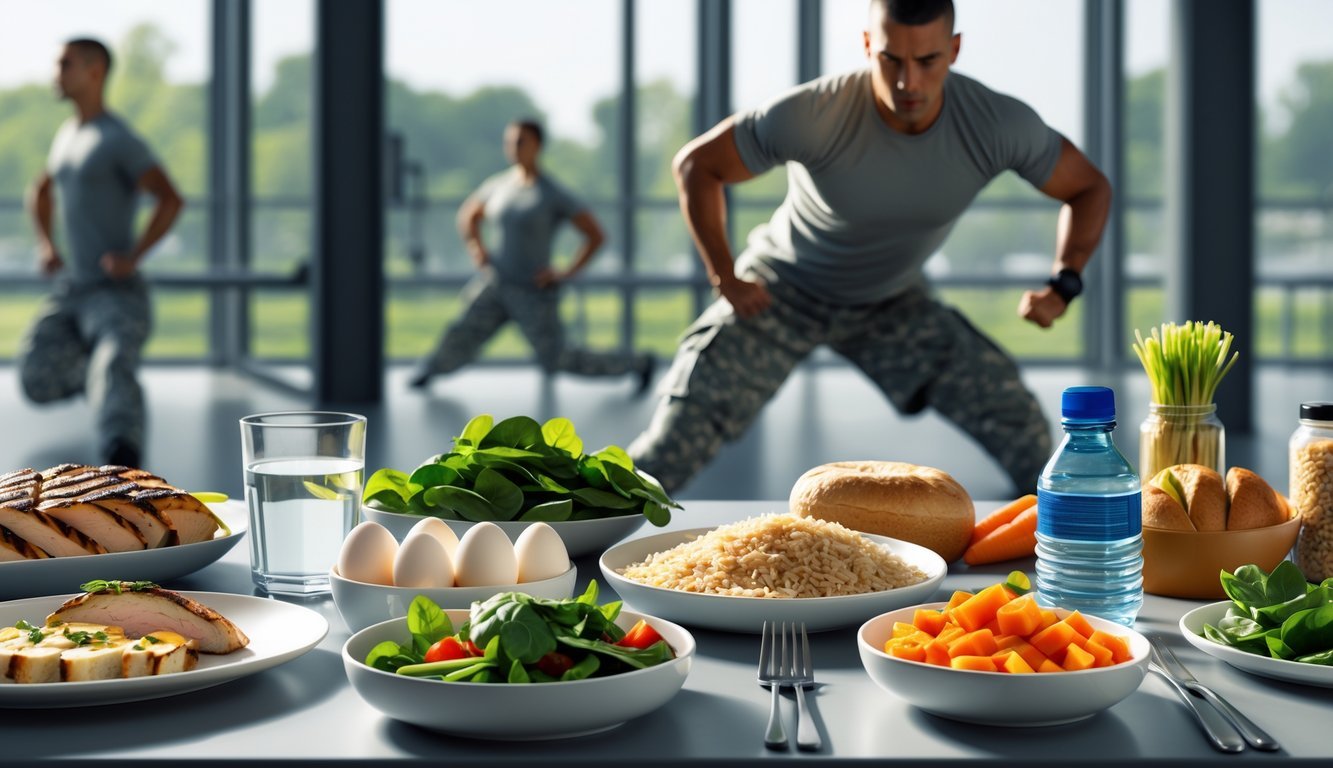Physical Address
304 North Cardinal St.
Dorchester Center, MA 02124
Physical Address
304 North Cardinal St.
Dorchester Center, MA 02124
Nutrition significantly impacts performance in the Army Combat Fitness Test (ACFT). Focus on balanced meals and easy-to-digest carbs for optimal energy and endurance.

Dialing in your nutrition before the ACFT really can make a difference in how you feel and perform. Grab a simple carbohydrate snack about 30-60 minutes before the test to give your body some quick energy—without feeling weighed down. A banana, a slice of toast, or a handful of berries usually does the trick.
In the days before your test, stick with balanced meals that include lean protein, whole grains, and plenty of veggies.
That combo builds endurance and helps you show up strong on test day.
Skip heavy, greasy foods since they can slow you down or just make you feel off.
You want easy-to-digest fuel that’ll keep your energy steady.
Well-timed, smaller meals can help you stay sharp and strong when it matters most.

To get ready for the Army Combat Fitness Test (ACFT), you need to fuel your body with the right foods and stay hydrated.
This approach boosts your strength, endurance, and overall physical fitness on test day.
Even simple food choices right before and on test day can really affect your energy and performance.
The right nutrition gives your muscles and body the fuel to handle all six ACFT events.
Balanced meals with whole grains, lean proteins, fruits, and veggies build strength and maintain endurance.
Before the test, pick complex carbs like oatmeal, sweet potatoes, or whole grains to keep your energy going longer.
Avoid high-fiber or heavy meals right before the test since those can leave you uncomfortable.
A light snack with simple carbs—think banana or granola bar—about 30-60 minutes before the ACFT can give you a quick energy boost.
Carbohydrates act as your main fuel during the ACFT.
Focus on complex carbs from whole grains and veggies to keep your energy steady.
Protein helps repair and strengthen muscles.
Lean options like chicken, yogurt, or peanut butter fit nicely in your meals.
Fats, if you keep them moderate, provide extra energy and support long-term health.
Just don’t eat a lot of fat right before the test.
A good pre-ACFT meal might be brown rice, grilled chicken, and steamed veggies.
Snacks like yogurt with fruit or a peanut butter sandwich work too.
Stay hydrated before and during the ACFT—it really matters.
Water keeps your muscles working, prevents cramps, and helps your body stay cool.
Drink plenty of water the day before and the morning of the test.
Sports drinks can help replace electrolytes if you sweat a lot, but don’t overdo them.
Skip sugary drinks or too much caffeine since those can dehydrate you.
Tips for hydration:
Hydration keeps your energy up and helps you perform your best during the test.

To get the most out of the ACFT, plan your meals and snacks with both timing and food choices in mind.
Your fueling strategy should fit the test’s demands and your own needs.
That way, you keep your energy steady and avoid any stomach issues.
Eat a balanced breakfast at least 2-3 hours before the ACFT.
Include whole grains, lean protein, and some fruit or veggies for lasting energy.
Oatmeal with a banana and a bit of peanut butter is a solid choice.
If your test starts early, a small snack 30-60 minutes before the event can help.
Stick with simple carbs like a piece of toast or a few berries.
Skip heavy or greasy foods right before the test—they can upset your stomach.
After the ACFT, try to refuel within 30 minutes with some protein and carbs.
This helps your muscles recover faster.
The ACFT has six events—deadlift, push-ups, and a two-mile run, just to name a few.
Each event taps into different energy systems, so your meal should support both strength and endurance.
For deadlifts and push-ups, eat protein and carbs to build muscle stamina and give you quick energy.
Lean meats, eggs, or dairy with starchy veggies or grains work well.
For the two-mile run and other endurance events, focus on carbs to fuel your aerobic system.
Fruit, whole-grain bread, or low-fiber snacks are good before these.
Aim for a meal that supports both your strength and endurance for all six events.
Everybody reacts differently to food.
Your age, gender, body type, and metabolism all play a part in what works best.
Younger people sometimes need more calories, while older adults might focus on nutrient-rich foods.
If you have allergies, special metabolic needs, or certain dietary preferences, adjust your plan.
What works for someone else might not work for you.
Pay attention to how you feel after different foods and meal timings.
Some people do better with just a light snack, while others need a bigger meal before the test.
Find what helps you feel your best.
Registered dietitians and strength coaches can give advice tailored to you.
Check out resources from groups like the National Strength and Conditioning Association or military.com.
Fitness writers and dietitians share practical pre-ACFT nutrition tips too.
Their advice can help you build a meal plan that’s backed by science.
Stick with trusted sources to avoid bad info.
Expert guidance helps you fuel up right and reach your fitness goals.

Eating balanced meals with lean proteins, whole grains, and fruit helps you show up ready.
Timing your meals and picking easy-to-digest carbs before the test really matters.
Staying hydrated also keeps your energy and focus up during the ACFT.
Go for a balanced meal with lean protein like chicken or fish.
Add whole grains such as brown rice or quinoa, and toss in some veggies for vitamins and fiber.
That combo fuels your body and keeps your energy steady.
Simple carbs like a banana or a slice of toast work well.
Berries or a small handful of almonds can also give you quick energy without making you feel heavy.
Pedialyte replenishes electrolytes like sodium and potassium.
This helps keep you hydrated and may prevent muscle cramps, especially if you sweat a lot during training.
Pick foods that are low in fiber and easy to digest.
Yogurt, fruit, or a small energy bar usually work without upsetting your stomach.
Skip heavy or greasy foods that might slow you down.
Water is your best bet before and during the test.
You can add electrolytes if you expect to sweat a lot.
Avoid sugary drinks or caffeine right before the ACFT to keep your energy steady.
Yeah, it’s a good idea to eat a small, simple carb snack about 30 to 60 minutes before your session.
That way, your muscles get some quick fuel and you probably won’t feel weighed down.
You could go for a banana, a slice of toast, or just a handful of berries.